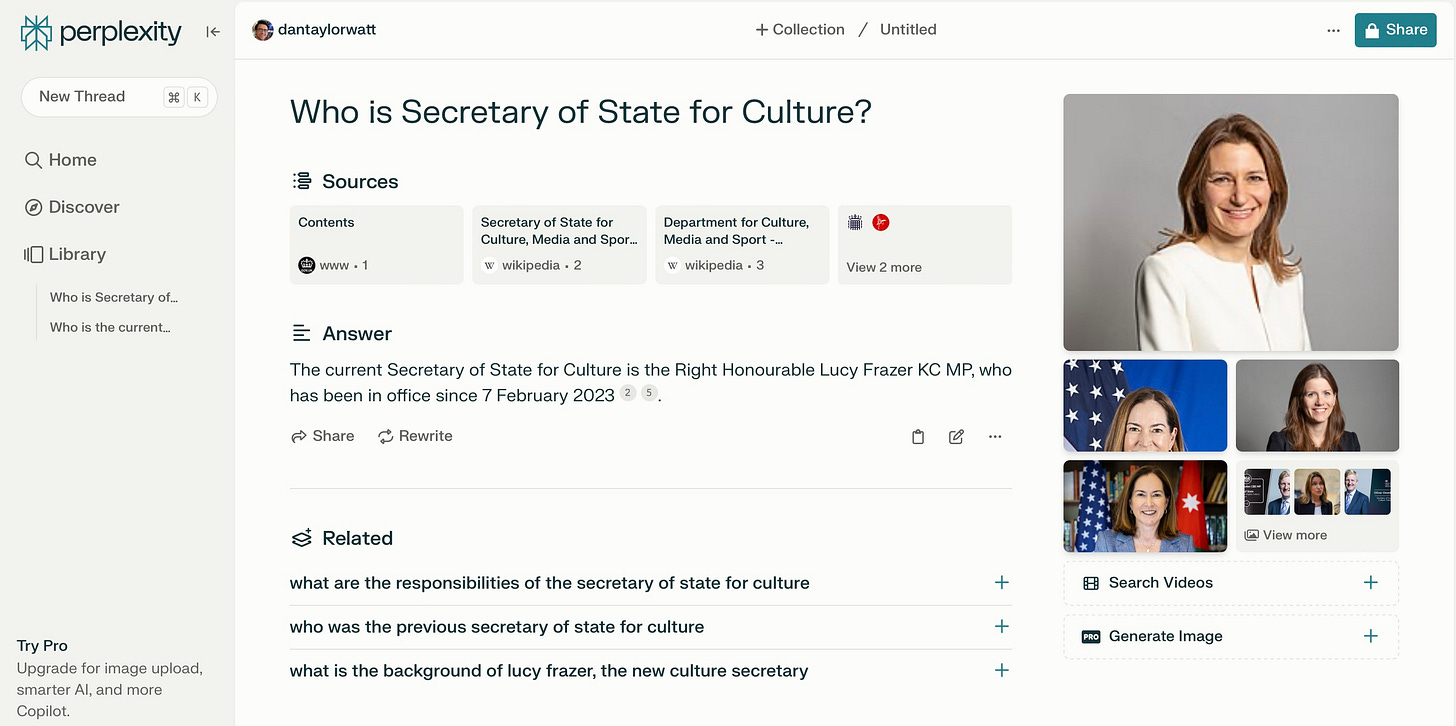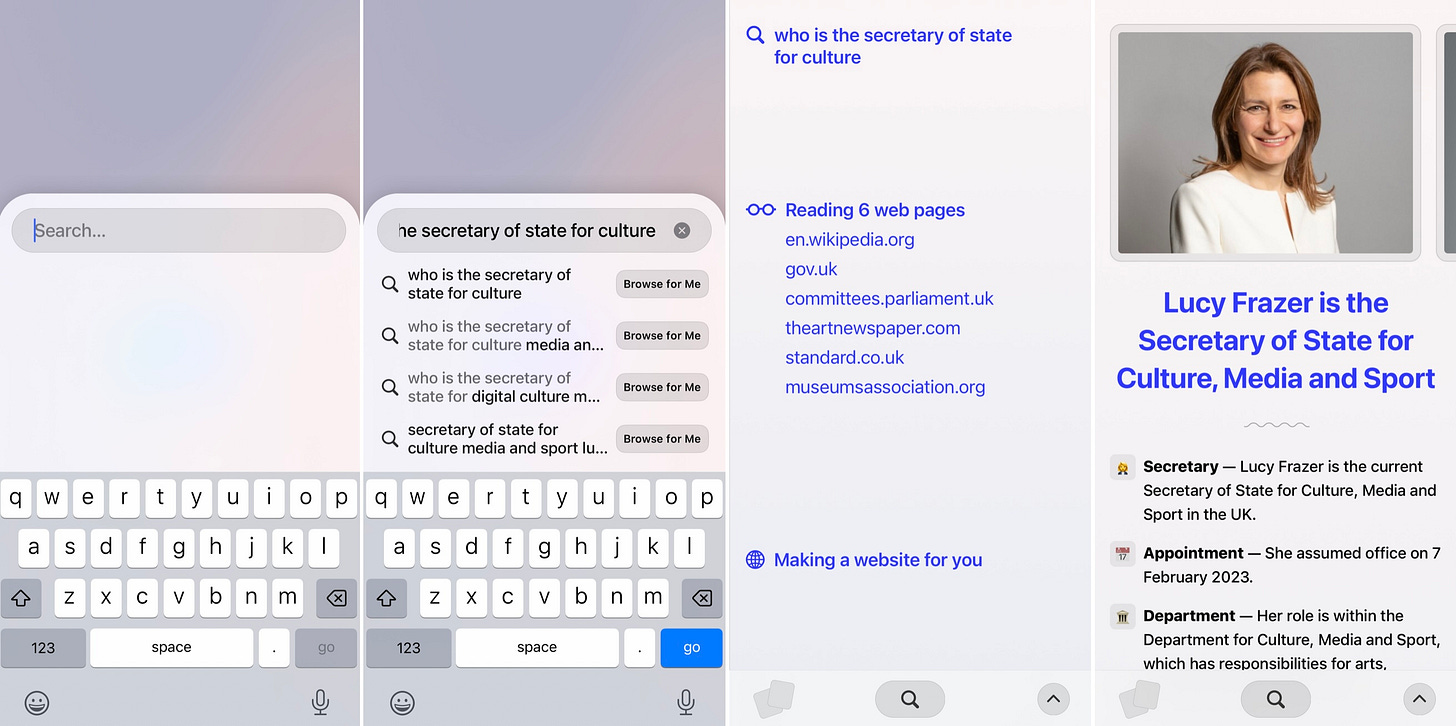How Generative AI is starting to change Search
ChatGPT is not a search engine, Large Language Models (LLMs) are not Large Knowledge Models and, on their own, are not reliable sources of information.
OpenAI, Microsoft and Google are all acutely aware of this and its potential impact on adoption of their respective AI chatbots and have applied sticking plasters by performing web searches/RAG in the background when prompts look to require more accurate or up-to-date information than an LLM can provide and adding in clickable citations/footnotes.
Google has also added the ability to “double-check” a response - click the Google icon underneath a Gemini response and it will add coloured highlights to denote which statements matched with web content and which couldn’t be corroborated. Of course, the web is full of bogus and - increasingly - AI-generated information (see below example of Gemini flagging an accurate statement it made because of a forum post discussing one of my favourite LLM hallucinations).
In another part of the Google forest, it continues to test its Search Generative Experience (SGE) - a new panel presented above the traditional search results, which aims to give searchers the information they need in situ.
It’s been in Search Labs for 9 months now and there’s no sign of if and when it will make it out of the Lab(s).
Part of the challenge is how SGE works with Google’s incredibly well-oiled and highly lucrative ad machine.
Whilst Google’s brightest minds wrestle with this, a number of new entrants have emerged, unencumbered by a profit margin and shareholders.
Leading the charge is Perplexity. Founded in 2022, it uses its own LLM which is optimised for factual and up-to-date responses. It also inverts the prominence of LLM-generated text and sources. Sources are presented first, with the LLM-generated text, related images/videos and suggested follow-up queries underneath.
It’s a seemingly small change but it has a big impact on the experience, which I am increasingly turning to where previously I would have turned to Google or ChatGPT.
Another contender is Arc Search, which is looking to become your default mobile browser. Unlike Perplexity, which has various bells and whistles, Arc Search pares the UI right back to a big search input box which returns regular Google results unless you hit the ‘Browse for Me’ button.
If you do, Arc Search ‘reads’ 6 web pages and then sets about ‘Making a website for you’ with a carousel of images, blocks of LLM-generated bullets (complete with emojis) and lists of search results.
Both products seem predicated on the assumption that an LLM-written summary will be more appealing to users than wading through multiple Google results and that elevating sources from sporadically applied footnotes to a front-and-centre component of the UI creates a better search experience than multipurpose chatbots can provide.
However it’s hard to see a moat here. Google and Microsoft will watch these new entrants closely and find ways of emulating what’s working without torpedoing their ad revenue.
There’s also a significant force of habit to contend with. Starting our web journeys with Google has become second nature to many of us. Initially this was down to the superiority of the results (versus search engines not using PageRank). More recently it’s in no small part because Google Search is the browser/OS default (which Google pays scale platforms handsomely for).
The ubiquity of the Google Search box has also increased our usage of it as a navigational shortcut. 14 of the 20 most common search terms last year were the names of other websites, including ChatGPT and - believe it or not - Google (not everyone knows/remembers those ubiquitous search boxes will give them results from Google).
Speed of response feels like another factor currently in Google’s favour, although Groq’s Language Processing Unit (LPU) is looking like a potential game-changer.
One AI search start up taking direct aim at Google is Exa (ne. Metaphor). Their mission is to “organize the world’s knowledge” (Google’s is “to organise the world's information and make it universally accessible and useful”) and they rebranded because “Exa means 10^18th power. Google means 10^100th power. While Google aims to surface all information, Exa aims to filter all information into organized knowledge. And when it comes to organized knowledge, 10^18 is greater than 10^100.”
How? By “filtering the internet by meaning, not by keyword”. A bold ambition, although they’re currently focussed on providing a knowledge API to LLMs and the UX of their user-facing search is underwhelming.
It’s strikes me how similar most of these products are to existing search UIs. In the near-term it feels like we’re getting an LLM-powered evolution of Google’s Knowledge Panels, alongside the tried-and-tested ‘10 blue links’.
As much as I’m using and appreciating Perplexity, I can’t help feeling AI’s going to unlock some other ways of finding stuff out.
Circle to Search feels like a potentially meaningful innovation, enabling searches that would previously have been laborious or impossible. I would love to know when and how it’s being used (any Pixel 8 and Galaxy S24 owners want to share their experience?)
As is so often the way, the elephant in the room is TikTok, which an Adobe study suggests 40% of Americans are now using as a search engine. How long before TikTok starts generating synthetic videos in response to search queries?





